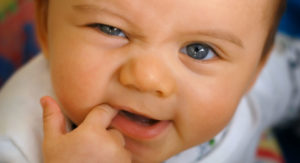 HYANNIS – When your baby is crying in the middle of the night from teething pain, “it can be very hard to stay rational,” said Gregory W. Parkinson, MD, of Falmouth Pediatric Associates.
HYANNIS – When your baby is crying in the middle of the night from teething pain, “it can be very hard to stay rational,” said Gregory W. Parkinson, MD, of Falmouth Pediatric Associates.
“You’re worried and sleep-deprived – that combination can make you want to reach for something and not think about how it’s been tested or if it’s been tested.”
Dr. Parkinson was referring to products marketed as remedies to soothe teething pain that may contain harmful or unknown ingredients, such as oral gels, liquids, lozenges, ointments and sprays containing benzocaine, or homeopathic preparations.
Benzocaine OTC Products
The U.S. Food and Drug Administration and the American Academy of Pediatrics both urge parents not to use oral pain relief preparations containing benzocaine, as this anesthetic has been linked to cases of methemoglobinemia, a potentially life-threatening condition that reduces the ability of red blood cells to carry oxygen.
Over-the-counter medications for oral pain relief containing benzocaine include Orajel, Anbesol, Hurricaine, Cepacol, Chloraseptic, Topex and store brands. Many of these products have been on the market for decades. Several over-the-counter pain and itch relief products also contain benzocaine.
The FDA has been watching the issue for some time. Back in 2006, it issued a public health advisory cautioning against use of benzocaine sprays in medical procedures, and by caregivers and parents for topical pain, if the patients were under 4 months of age, elderly or with certain medical conditions.
Last year, the FDA asked manufacturers to remove from the market benzocaine oral preparations sold for use in infants and children, and place warning labels on oral medications containing benzocaine that remain on store shelves.
Dr. Parkinson said questions from parents about teething are very common.
“Many parents are aware of this at this point,” he said. “Often it’s the grandparents remembering what they used to do.”
Homeopathic Remedies
In 2010, the FDA warned consumers against using Hyland’s Baby Teething Tablets, and in 2016 and 2017 took further action against two makers of homeopathic teething products that contained belladonna, a toxic plant.
The products, sold under the Hyland’s and Raritan Pharmaceuticals brands, were recalled. Belladonna, also known as deadly nightshade, can cause hallucinations, disorientation, agitation, dilated pupils, dry skin and mouth, raised body temperature, constipation and decreased urination.
Because homeopathic products aren’t considered pharmaceuticals by the federal government, they are not subject to the same standards and testing.
Just because many are marketed as “all natural” or “organic” doesn’t mean they’re safe for small children, Dr. Parkinson said. “We have to take a conservative approach and advise to stay away from it until it’s been tested.”
Teething Jewelry
More recently, the FDA took a stand against teething jewelry, which can be made for a variety of substances and worn by either the child or caregiver. Such jewelry is also sometimes used for sensory stimulation for people with special needs including autism and attention-deficit/hyperactivity disorder (ADHD).
In a December announcement, the FDA said strangulation, choking, infection and mouth damage may be caused by teething jewelry, which can be a necklace, bracelet or anklet. Furthermore, jewelry made of amber can contain succinic acid, which the FDA says it has not evaluated manufacturers’ claims that it is anti-inflammatory and relieves teething pain. Necklaces also can be made of marble, wood, silicone and metal.
What Doctors Advise
The American Academy of Pediatrics recommends the following to ease teething pain:
• Rub or massage the baby’s gums with your clean finger.
• Give the child a rubber teething ring to gnaw on.
• Don’t freeze liquid-filled teething rings, as they may damage the child’s mouth
• Avoid pain-relieving liquids and gels as they quickly wash away, are swallowed and may contain harmful substances.
Drooling and a baby’s desire to put things into their mouth are all normal behaviors that may or may not indicate teething, Dr. Parkinson said. First, determine if your baby is teething, which occurs between 4 and 12 months of age. Studies do not support the idea that babies will get a fever with teething, but the baby is often fussy.
“There are some kids that suffer though every tooth,” Dr. Parkinson said. “Some, you need to look in their mouths (to see if they’re teething).”
He advised parents try to calm their teething child and themselves, provide a hard rubber teething ring and, if the child can’t sleep and is over 6 months old, give a dose of acetaminophen or ibuprofen. Aspirin should be avoided for children under 19 because of the risk of Reye’s syndrome, which damages the liver, brain and other organs and is often fatal, according to the National Reye’s Syndrome Foundation.























